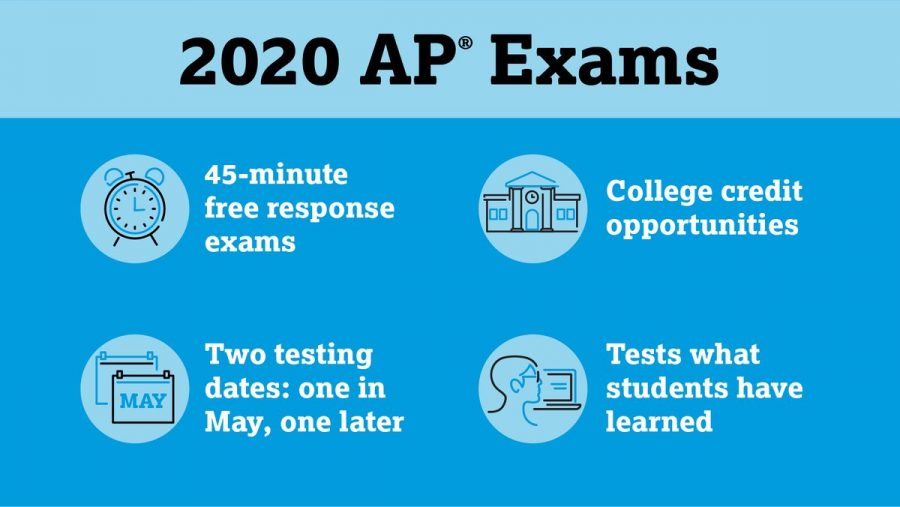Changes to the AP: Should the College Board cancel it entirely?
April 7, 2020
On Friday, March 20, 2020, the College Board announced that traditional face-to-face exam administrations will not take place due to the outbreak of coronavirus. Instead, 45-minute online free-response examinations at home will be administered. AP exams are typically two to three hours long and only administered at high schools and designated testing centers. The test is usually broken up into multiple-choice and free-response sections.
Viewpoint students and high schoolers around the world were shocked and concerned to see this monumental change in AP exam administration and formatting.
“I don’t think that the way the APs have been changed is effective. Now it’s easier for everyone to cheat and colleges can’t consider it because of this. This test is not a fair way to test our knowledge on what we’ve learned,” said Hannah Keyes (’21). Keyes is currently enrolled in four AP classes and is planning on taking the modified exams in May.
The questions of cheating and college credit on the new APs have been hotly discussed. According to an email sent out by the College Board, students who attempt to gain an unfair advantage on the AP exam will be prohibited from taking future exams created by the College Board (such as the SAT, SAT Subject Tests, or CLEP assessments), they will have their scores canceled, and will contact the high schools or colleges that they have had their scores sent to.
The College Board has also noted on their website that, “under certain circumstances, College Board may inform law enforcement of any incident to determine if prosecution of the test taker, or anyone assisting the test taker in misconduct, is warranted.”
Despite the exam being open note, the College Board has indicated that no points will be earned from content that is found in textbooks or online. This has caused widespread confusion amongst students. “I just don’t see how one question can measure our intelligence on this subject. If you don’t know that one question then you’re just going to fail automatically,” says Keyes (’21).
The test will also include plagiarism detection software in post-administration analytics, to protect against cheating. “In addition, each student’s AP teacher will receive copies of the work the student submits to us, enabling teachers to spot inconsistencies with students’ known work,” states the College Board’s website.
However, these measures and messages do not concern some students. On the popular social media platform TikTok, thousands of students joke about cheating on the new exams. One post reads, “When you can cheat on the online AP Exam,” and is captioned, “You get a 5, you get a 5, you get a 5”. It is unclear how the College Board will combat the likely test grade inflation that will occur with online testing.
“We’re confident that the vast majority of higher ed institutions will award college credit as they have in the past. We’ve spoken with hundreds of institutions across the country that support our solution for this year’s AP Exam,” says an email from the College Board.
Another concern about the new exams is with students who don’t have access to computers and the internet. According to the U.S. Census, 3 million students in America do not have internet in their home — 17 percent of all students. It is unclear what the College Board has prepared for these students, but their website states that they are working with partners to ensure that every student has the tools and connectivity to review AP content online and take the exam.
Many students do not know how to properly study for the new tests. “The books we would normally have aren’t really effective so I guess I’ll look at what the College Board recommends and what our teachers say,” says Keyes (’21).
On April 3rd, 2020, the College Board provided students and teachers with what is being covered and the types of questions that students may encounter on the test. On March 25th, 2020, the College Board began offering free live AP review courses taught by AP teachers on YouTube. On April 13th, 2020, the College Board will give students optional free-response questions to help them practice the concepts and skills that will be tested in May.
The changes the AP test has undergone is reflective of the uncertainty of this time. While the College Board is trying to keep the AP for normalcy and profit’s sake during this period, many students resent having the stress of taking an experimental, largely unknown test during a global pandemic.
Keyes (’21) states, “it’s kind of like we’re just going into it blind. It’s a very unfair situation for high schoolers and I don’t know how it’s going to affect our futures.”
